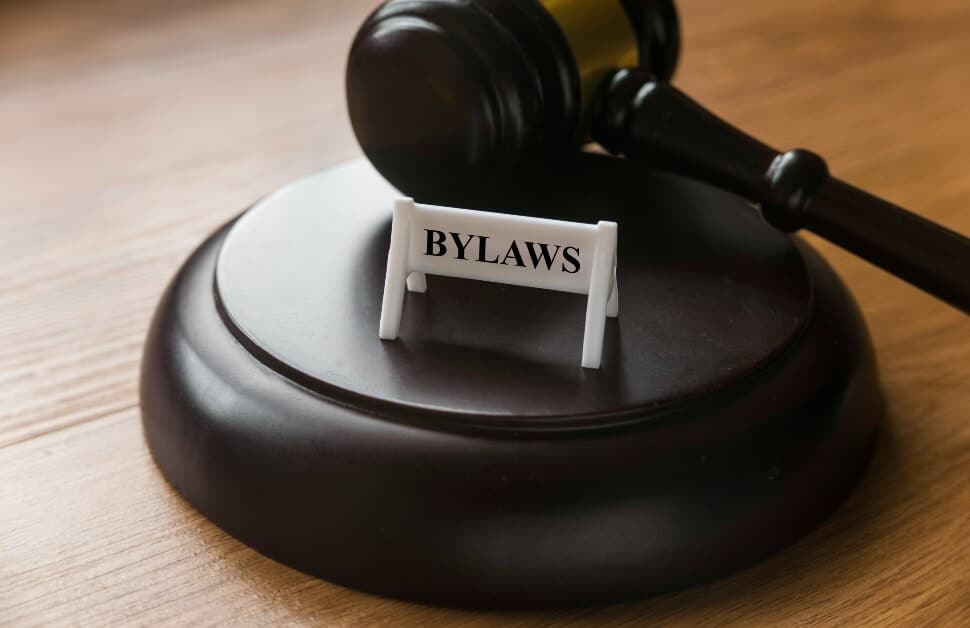

Paul offered this guidance to the church in Corinth when their meetings became chaotic and disorderly. Multiple people were prophesying and speaking in tongues simultaneously with no one to interpret.
According to Paul, interpretation is essential to give meaning to church proceedings that otherwise appear to be senseless babel.
Church bylaws function in a similar way as the Corinthian interpreters (or lack thereof). They prevent church actions, governance, and decisions from becoming chaotic and confused. They furthermore render those decisions or actions intelligible before a judge if they are ever challenged in court.
Church bylaws are an essential foundation for the church’s structure, leadership, decision-making, and other governance procedures.
This article further explores the question: What are church bylaws? It also provides vital considerations for church leaders when drafting its bylaws, which is an essential process when determining how to start a church legally.
So what are church bylaws? They detail the vision, mission, governance, and operational activities that are established in a church’s articles. Church bylaws also form an agreement among church members, acting as guardrails necessary for healthy church governance and action.
For example, your bylaws should provide the qualifications for and manner of appointment/election of all church directors and officers. They detail the responsibilities of those directors and rules for handling director vacancies, removals, resignations, board meetings, etc. These bylaws encourage fair and transparent decision-making, holding leaders accountable for church procedures and decisions.
While the specific details of church bylaws may vary depending on your denomination and local context, here are some provisions that are typically included in church bylaws:
Now that you know the basics of church bylaws, you might be wondering: Are church bylaws legally binding ? The answer is yes. As a legal framework for church proceedings, bylaws help your church operate in a way that’s consistent with its mission and values. They provide clear guidance for leaders and members, keeping church proceedings compliant with legal requirements and focused on its goals.

Mapping your structure, leadership, decision-making, and other governance procedures helps your church properly use its property, finances, and structure to accomplish its mission.
In addition to remaining consistent with internal governance, your church bylaws help you comply with state and federal laws. Orderly bylaws, therefore, divert potential legal claims and conflicts from striking your church’s assets, mission, and reputation.
If you’re in the process of drafting new church bylaws or revising existing ones, the following five tips will give you a head start on legally protecting your church — while promoting transparency and accountability among members.
1. Be attentive to the unique needs of your church, but don’t reinvent the wheel. Look to other churches that have a similar ecclesiology or polity to yours, and use their bylaws as a starting point to draft your own. But don’t be lazy in failing to adapt the governance glove where it doesn’t fit your church. Your bylaws should suit your vision, mission, and operations.
2. Keep your bylaws direct and short. Your bylaws should be at most 10 pages. The language should be concise, making them easier for members to read, remember, and follow. (This will also help you follow the best practices noted in tip No. 5).
3. Seek professional counsel. “Where there is no guidance, a people falls, but in an abundance of counselors there is safety” (ESV, Prov. 11:14). A professional can identify pitfalls you might not be aware of. Ask a qualified church lawyer to review and tailor your bylaw template to align with your procedures and mission.
4. Require all new directors to read, understand, and pledge to operate according to church bylaws. Make them accessible by keeping a board notebook with all essential documents, including articles, bylaws, resolutions, statements of faith and meeting minutes from the last two years (at least).
5. Review your bylaws regularly. All directors should review church bylaws (and other vital documents) annually or bi-annually. It’s easy to forget procedural nuances. If your leaders begin wandering outside the scope of your church’s governing documents, it could tempt a dissident member to challenge important decisions (in some cases years down the road).
Without thoughtful, appropriately tailored, state-compliant bylaws that are visibly in place and connected, your church governance could veer off course and wander from its mission and values. It could also become tempted by spontaneous decision-making, inconsistencies, and conflict. This unprotected state can significantly increase your church’s vulnerability to internal disputes and legal challenges.
Don’t leave your church unprotected from the legal ramifications of incoherent proceedings, operations, and decisions. Consult an experienced church lawyer when developing and updating your bylaws to make sure they comply with state and federal laws and promote your church’s mission.